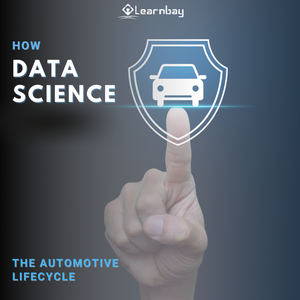How Data Science Is Utilized Throughout The Automotive Lifecycle
Body
The Ford Model T was introduced in 1908 and quickly became popular because of its low prices, durability, adaptability, and simplicity of upkeep. It is credited with "setting the globe on wheels" by increasing global mobility through operational efficiencies at a cost the typical consumer could afford.
Today, the automotive sector is still on the cutting edge of technology, changing how people get from where they need to go. Michael Crabtree, Data Scientist at Ford Corporation stated in a recent webinar that the fundamental change is that its growth is now pushed by data science rather than manufacturing.
Click here to learn more about the data science course in Mumbai, which is trending in the market.
In the automotive industry, smart cities actually require Data Science.
Data science is expanding mobility across low-income regions like the Model T's industrial scalability did over a century ago. It eases the transition for all, regardless of socioeconomic standing, gender, or abilities, by making transportation widely accessible without the high cost of ownership.
For example, optimization algorithms can supply entrepreneurs with energy-efficient cars to service regions for projects ranging from Amazon delivery times to plumbing, but mostly food delivery. Data scientists are working with vehicle and car engineers to create automobiles that benefit differently-abled individuals. These are just a few examples, but Michael claims there are almost limitless applications for machine learning, with so many more yet to be discovered.
Working with Data
Because of the automobile industry's maturity and breadth, organizations have several opportunities to rebuild around data.
One application interacts with data from many data systems and types. Several data scientists are used to working with tabular data, which is data in a pivot table, similar to Excel. However, passenger vehicle data scientists can access a much broader range of data. For example, direct instrumentation data is often recorded as a stream of binary numbers in the automotive industry. They may also come across data from intelligence systems, such as pictures and sensor point clouds. A vehicle data scientist may be needed to understand why autonomous vehicles perform in a given way and how this differs among vehicle models.
Every stage of the automobile product lifecycle involves data science.
Product development is fueled by data science.
Several stages must be completed before a vehicle can be leased to a consumer. Product development is where data science in autos begins. Data science is used to analyze new model settings and model component part reliability, among other things. Data science improves the technique through experimentation and evaluation at scale rather than developing components and testing at each level as an isolated system.
Manufacturing excellence is driven by data science.
In addition, automotive data scientists verify that only high-quality autos are marketed. While engineers seem to be able to test the functionality of each car, each vehicle must be tested individually. Data scientists can analyze a large population containing parts, sellers, and test data. They extensively examine suppliers' financial performance, forecast their ability to provide goods on time based on previous performance, and employ econometrics and regressions to assess the economical situation of supplier locations.
Data science propels connected and self-driving vehicles.
Connected and autonomous automobiles, which rely upon models of deep learning and sensor fusion techniques, are one of the trendiest subjects in futurology today. Data science is critical to developing these vehicles: It converts IoT indicators such as oil life screens, charger monitors, and comprehensive diagnostics instruments into actionable data. It isn't enough to simply discover a person; sensors must also be able to determine where they're walking. Safety systems, such as driver security and ecological safety, are also essential.
Sustainability projects are driven by data science.
All automobile manufacturers place a high value on sustainability. Governments set requirements for fuel usage, but each automaker has its own set of objectives. Yet because each motor has a distinct fuel economy, data science is required to optimize the fuel savings of a company's whole vehicle line. Hence, if a corporation wants to sell a giant natural truck and an electric car, mobile data scientists can optimize to reduce the whole fleet's fuel consumption while meeting the company's global sales targets. Automobile manufacturers may be able to claim regulatory credits for energy efficiency due to optimization work. This has three advantages: it is healthy for the environment, provides more value to customers, and opens up a new market.
Last Lines
Aside from what we've already said, data science impacts many other stages of the automotive lifecycle. Data science predicts consumer mobility and churn in marketing and sales. Data science helps the consumer post-purchase experience and product quality in customer service and analytics. To go deeper into how data science techniques are impacting the future of automotive, visit the data science course in Pune, which comes with multiple domains.












Comments